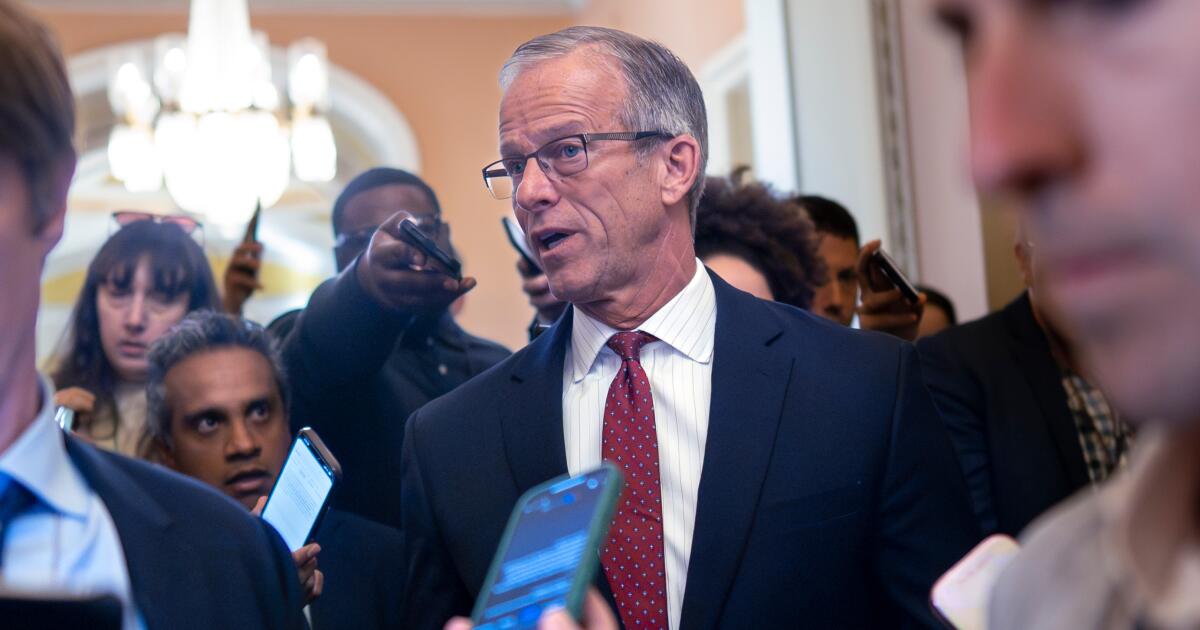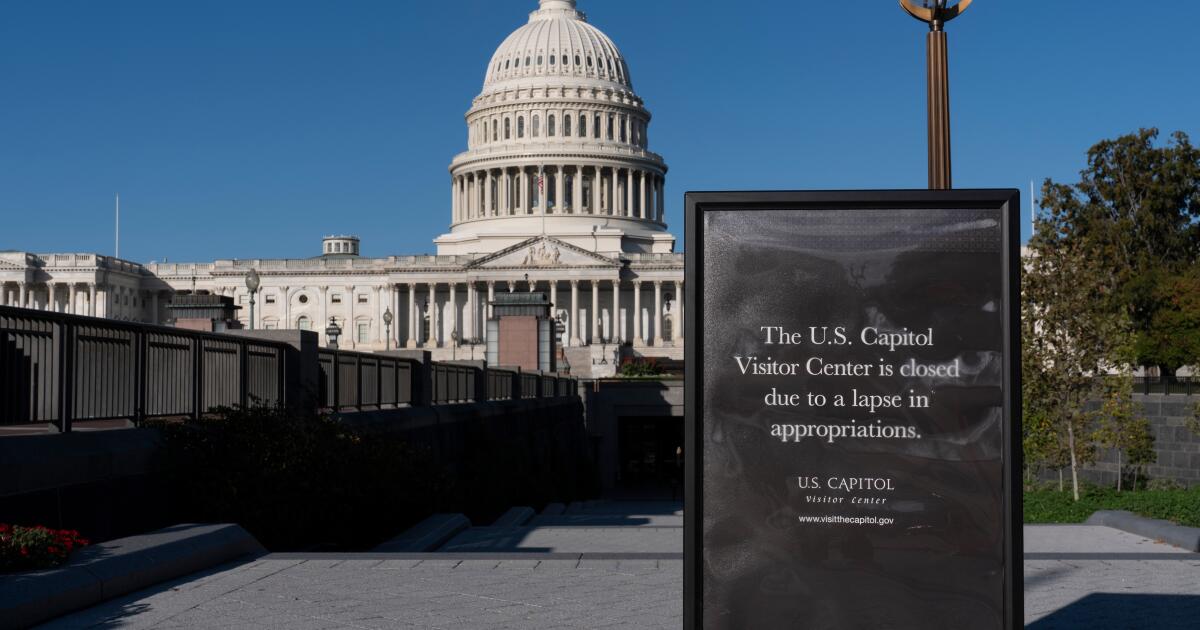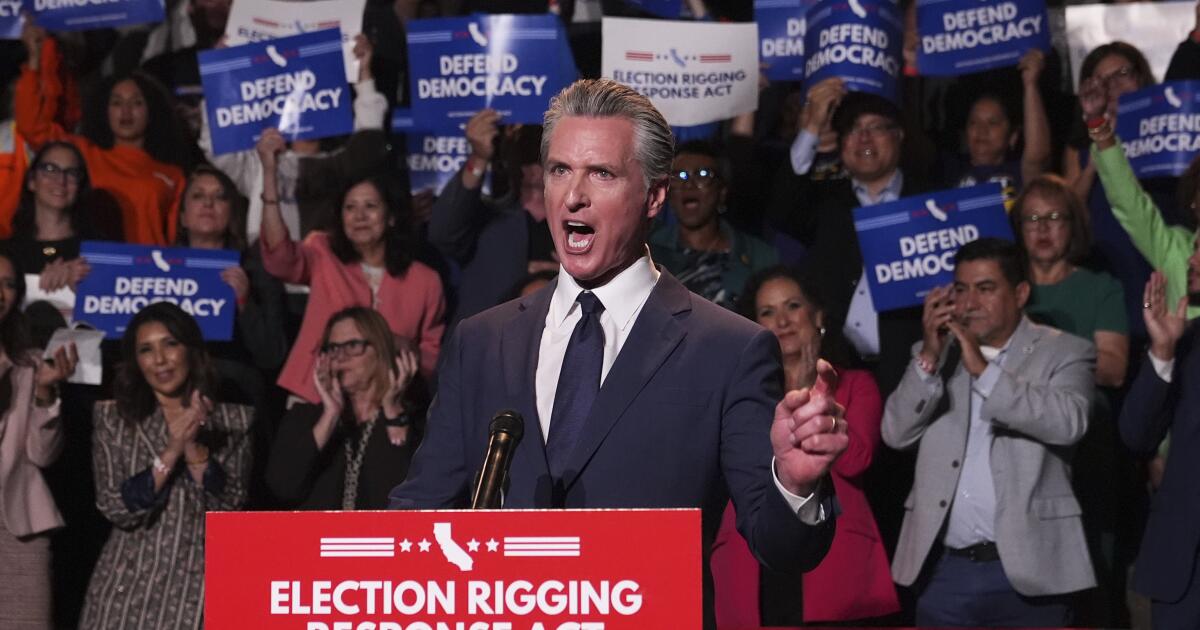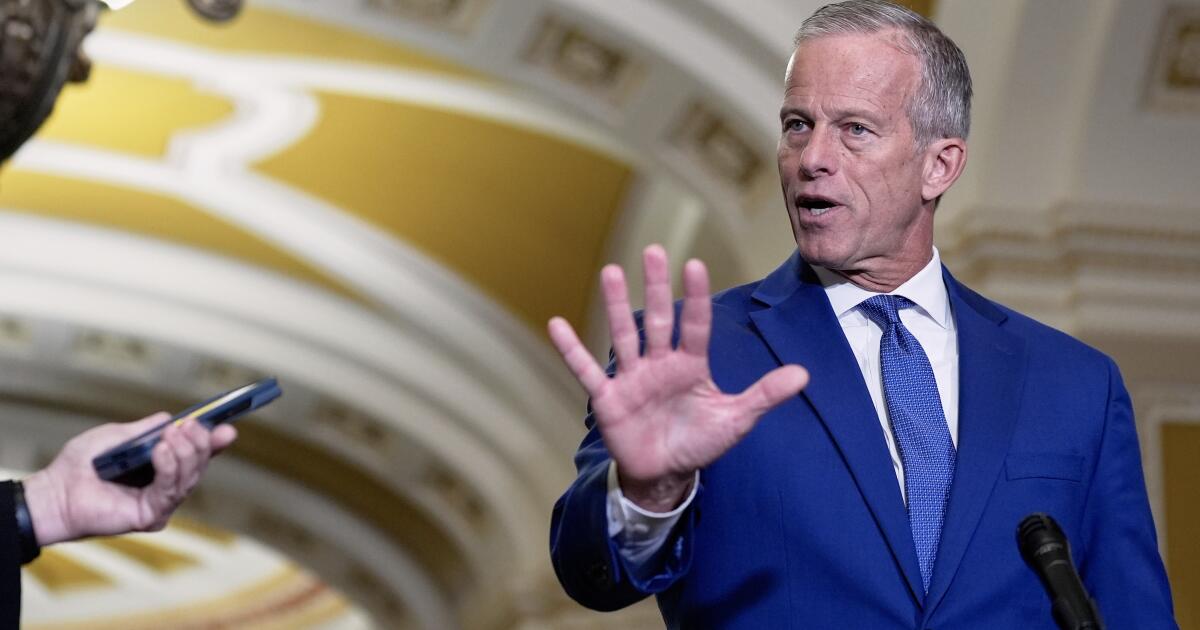Senate Republicans head to the White House in a show of unity as the shutdown enters fourth week
WASHINGTON — As the government shutdown enters its fourth week, Senate Republicans are headed to the White House on Tuesday — not for urgent talks on how to end it but for a display of unity with President Trump as they refuse to negotiate on any Democratic demands.
Senate Democrats, too, are confident in their strategy to keep voting against a House-passed bill that would reopen the government until Republicans, including Trump, engage them on extending health care subsidies that expire at the end of the year.
With both sides showing no signs of movement, it’s unclear how long the stalemate will last — even as hundreds of thousands of federal workers will miss another paycheck in the coming days and states are sounding warnings that key federal programs will soon lapse completely. And the lunch meeting in the White House Rose Garden appears unlikely, for now, to lead to a bipartisan resolution as Senate Republicans are dug in and Trump has followed their lead.
Asked about the message at lunch, Sen. John Barrasso of Wyoming, second in Senate GOP leadership, told Fox News Channel’s “Fox & Friends” on Tuesday that it will be, “Republicans are united, and I expect the president to say, ‘Stand strong.’”
Senate Republican leader John Thune, of South Dakota said on Monday that he thinks Trump is ready to “get involved on having the discussion” about extending the subsidies. “But I don’t think they are prepared to do that until (Democrats) open up the government,” he said.
Missed paychecks and programs running out of money
While Capitol Hill remains at a standstill, the effects of the shutdown are worsening.
Federal workers are set to miss additional paychecks amid total uncertainty about when they might eventually get paid. Government services like the Special Supplemental Nutrition Program for Women, Infants and Children, known as WIC, and Head Start preschool programs that serve needy families are facing potential cutoffs in funding. On Monday, Energy Secretary Chris Wright said the National Nuclear Security Administration is furloughing 1,400 federal workers. The Federal Aviation Administration has reported air controller shortages and flight delays in cities across the United States.
And as the shutdown keeps future health costs in limbo for millions of Americans, most U.S. adults are worried about health care becoming more expensive, according to a new Associated Press-NORC Center for Public Affairs Research poll, as they make decisions about next year’s health coverage.
Still, there has been little urgency in Washington as each side believes the other will eventually cave.
“Our position remains the same: We want to end the shutdown as soon as we can and fix the ACA premium crisis that looms over 20 million hardworking Americans,” said Senate Democratic leader Chuck Schumer, D-N.Y., on Monday, referring to the expanded Affordable Care Act subsidies that expire in December.
Schumer called the White House meeting a “pep rally” and said it was “shameful” that House Speaker Mike Johnson, R-La., has kept the House out of town during the shutdown.
November deadlines
Members of both parties acknowledge that as the shutdown drags on, it is becoming less likely every day that Congress will be able to either extend the subsidies or fund the government through the regular appropriations process. The House GOP bill that Senate Democrats have now rejected 11 times would only keep the government open through Nov. 21.
Thune on Monday hinted that Republicans may propose a longer extension of current funding instead of passing individual spending bills if the shutdown doesn’t end soon. Congress would need to pass an extension beyond Nov. 21, he said, “if not something on a much longer-term basis.”
Democrats are focused on Nov. 1, when next year’s enrollment period for the ACA coverage begins and millions of people will sign up for their coverage without the expanded subsidy help that began during the COVID-19 pandemic. Once those sign-ups begin, they say, it would be much harder to restore the subsidies even if they did have a bipartisan compromise.
“Very soon Americans are going to have to make some really difficult choices about which health care plan they choose for next year,” Schumer said.
What about Trump?
Tuesday’s White House meeting will be a chance for Republican senators to engage with the president on the shutdown after he has been more involved in foreign policy and other issues.
The president last week dismissed Democratic demands as “crazy,” adding, “We’re just not going to do it.”
North Dakota Sen. John Hoeven said that Republican senators will talk strategy with the president at Tuesday’s lunch. “Obviously, we’ll talk to him about it, and he’ll give us his ideas, and we’ll talk about ours,” Hoeven said. “Anything we can do to try to get Democrats to join us” and pass the Republican bill to reopen the government, Hoeven said.
Still, GOP lawmakers expect Trump to stay in line with their current posture to reject negotiations until the government is open.
“Until they put something reasonable on the table to talk about, I don’t think there’s anything to talk about,” said Louisiana Sen. John Kennedy.
Democrats say Trump has to be more involved for the government to reopen.
“He needs to get off the sidelines, get off the golf course,” said House Democratic leader Hakeem Jeffries, D-N.Y. “We know that House and Senate Republicans don’t do anything without getting permission from their boss, Donald J. Trump.”
Jalonick writes for the Associated Press. AP writers Kevin Freking, Stephen Groves and Matt Brown contributed to this report.



